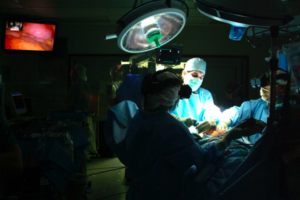Issue 7 – Volume 1 – February 2017
by Rachel Collins 
There are many reasons to choose surgery as a career: prestige, high income, even the pressure of expectation from others. All legitimate reasons which research shows are normal for students aspiring to be surgeons. (Baschera 2015)
Or if you’re like me, you just couldn’t imagine doing anything else. To you, medicine is surgery.
Let me explain.
Imagine a packed lecture theatre. This could only occur during week one of the MD, right? An inspirational senior clinician is addressing the class.
“Who wants to be a doctor to make lots of money?”
...a few hands are raised. Obviously a question you are not supposed to answer in the affirmative.
“Who wants to be a doctor to help people?”
...most of the class has their hands up. Mine is still down, waiting for the next option.
...next option?? There doesn’t seem to be another on offer.
I’m waiting for “who wants to be a doctor because they are obsessed with the human body?” or “who thinks the pinnacle of life would be being able to fix bodies from the inside?”
This is not to say that I don’t want to take care of people, because I do. I just see that as an excellent bonus to being able to do surgery. My life experience tells me that I would be able to provide empathetic care to my patients. It’s just that it isn’t my primary motivation. Who’s with me?
Ok. So, you want to be a surgeon. Let’s temper this obsession with the human body with some facts and statistics, as we still need to make an informed choice. Here is some information to help you.
The Royal Australasian College of Surgeons (RACS) is a great place to start looking for information on surgery and its nine specialties: cardiothoracic, general, neurosurgery, orthopaedics, otolaryngology head and neck, paediatric, plastic and reconstructive, urology and vascular. The JDocs website can also help you to understand the skills required to gain a place on a surgical training program.
Working hours
The ideal working hours for surgical trainees and fellows is a hotly debated topic around the world. Research has identified a mismatch between the number of hours that are optimal for surgical training, estimated at 60 hours per week, and the maximum of 55 hours per week which allows doctors to balance competing needs for lifestyle and study demands. (O'Grady 2012) In Australia, the average working week for a surgical fellow is 53 hours, higher than the 42 hour average for Australian medical practitioners. (AIHW 2015) Surgical trainees work even longer hours, averaging 61 hours with most working days exceeding 12 hours and on-call shifts being common. Five percent of trainees regularly work more than 80 hours a week. (O'Grady 2010)
Job flexibility and security
Part time work is currently the domain of older surgical fellows, mostly undertaken by those over 60 and uncommon in those under 40. Unemployment is rare in RACS members, however, so is parental leave. Access to flexible working arrangements can be difficult to establish, more so in the public sector. (RACS 2014)
Stress and Burnout
One in five surgical fellows report high levels of stress. Issues with administration such as perceived interference, inferior processes and burdensome regulation were given as the primary reason for high or extreme stress. Bullying was the cause of high or extreme stress in seven percent of respondents in the most recent RACS Census. One in ten has sought professional help for mental health issues. Burnout is not unique to surgeons but still a particular occupational risk. The biggest contributors to burnout are being female, working in a smaller hospital, working more than 60 hours per week, and working across both the private and public sectors. (Benson 2009)
Need for surgeons in the future
The RACS workforce projections have identified a need for increased surgical training in order to meet future demand, particularly in regional areas. (Birrell et al 2003) Almost three quarters of surgeons in public practice also felt that there was sufficient work for another surgeon in their practice. (RACS 2014) In terms of future demand for surgical specialties, clues can be gained from changes in elective surgery admissions across the different specialties. The most recent AIHW figures indicate expected increases across all specialties, with the largest increase in urology, closely followed by non-cosmetic plastic surgery and neurosurgery. (AIHW 2013)
However surgical training places remain hard to come by, with many more applications than there are positions available. (RACS 2016)
Scope for outside work
Surgeons have options to pursue work outside the theatre. Common options include: research, medico-legal work, teaching and surgical mortality audits. (RACS 2014)
To conclude, in the words of Eduardo Barroso, President of the European Surgical Association, “the key to success is...having our residents feeling tired but happy doing their job with true pleasure.” (Barroso 2014) I wish that to be true for myself and for all of you. Whatever your reason for wanting to pursue surgery as a career, the rewards are manifold.
Rachel Collins is a second year MD student. Rachel was a postdoctoral medical researcher in a previous life who found that intense focus on a particular field of research wasn’t enough and that she just wanted to know everything there is to know about the human body.